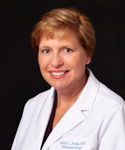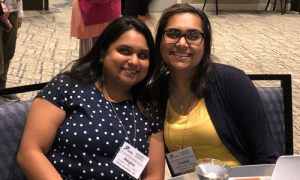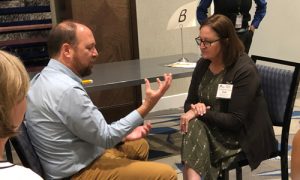The Training Rheum: ARP Collaborates with American Academy of PAs to Help Rheumatology Practices Onboard NPs & PAs
By Mike Fillon
ATLANTA—A new initiative, aimed at attracting nurse practitioners (NPs) and physician assistants (PAs) to rheumatology careers, kicked off in Atlanta Aug. 10–12. Dubbed The Training Rheum, the three-day boot camp is part of a budding alliance and collaboration between the ACR’s Committee on Rheumatology Training & Workforce Issues and the interprofessional division of the ACR, the Association of Rheumatology Professionals, and the American Academy of PAs.
REGISTER FOR THE TRAINING RHEUM

“It’s well known that we expect a significant shortage in rheumatology professionals, and we are looking at ways to increase our workforce,” said Beth Jonas, MD, FACR, chair and faculty member of The Training Rheum and chair of ACR’s Committee on Rheumatology Training and Workforce Issues. She said PAs and NPs are attractive candidates for rheumatology careers, because in many cases, they already have thousands of hours of medical training and have proven to be dedicated and versatile.
To this end, Dr. Jonas said the goals for The Training Rheum are to help medical practices quickly onboard NPs and PAs already on staff, and to ensure they’re comfortable and knowledgeable with rheumatology as their career choice and that it’s the right fit for everyone.
Dr. Jonas is the Reeves Foundation Distinguished Professor of Medicine, chief, Division of Rheumatology, Allergy and Immunology, and director, Rheumatology Fellowship Program at the University of North Carolina School of Medicine, Chapel Hill.
A Dire Shortage
Dr. Jonas said that rheumatology is already facing a shortage of rheumatologists and the future looks even bleaker. According to the ACR workforce study, the demand for full-time rheumatology providers for adult patients—including physicians—was 12.9% below supply in 2015.1 By 2030, that number is projected to drop by an additional 25.2% from 2015 baseline levels—a shortage of 4,000 rheumatology providers. Meanwhile, largely driven by an aging population, demand is projected to exceed supply by 102%. The shortage will be most acute in rural areas.

One of the students attending the meeting said the lack of rheumatology professionals is the main reason she enrolled in The Training Rheum. “When patients are referred to rheumatology, it’s a long, long wait for them to receive care,” said Karin Schmottlach, PA-C, at Metro Health University of Michigan Health Care, Grand Rapids. “Plus, we can’t even take all the patients in need. If I could help lessen that burden and help get people in earlier, that would be a nice benefit for our office and fulfill my career aspirations.”
Dr. Jonas said many PAs and NPs say they have received very little education in the area of rheumatic diseases. “Even when they’ve completed their training, graduated and are going into practice, they have a knowledge deficit. So one of the goals of this program is to help bridge that gap. Our hope is that this meeting will give the attending PAs and NPs foundational knowledge, so when they are working alongside rheumatologists, they will understand the basic underpinnings of our diseases, how to work with the patients, how to do a careful physical examination and be comfortable with the application of sound non-pharmacologic and pharmacologic care of patients with rheumatic diseases.”
That was exactly what Elizabeth Pinta, PA-C, with Columbus Arthritis Center, Ohio, experienced. “The meeting not only reinforced things I’ve already learned and served as a confidence booster in that way, but it also made me aware of areas I need to learn more about, which is very helpful.”
Initially, organizers of The Training Rheum planned to close enrollment at 35 students, but as the waiting list grew, they decided to expand the group to 55, without compromising the personal, hands-on, interactive attention the students and faculty wanted. The group ended up with close to identical numbers of PAs and NPs.
The curriculum proved valuable for PAs and NPs new to the profession and those transitioning to a rheumatology practice. It was also ideal for Chris Barrett, MSS, PA-C, from Salud Medical Center, Woodburn, Ore., who has been a PA focused on rheumatology since 2010. “While I’ve taken a couple of CME courses in rheumatology, much of my rheumatology knowledge comes from books, journals and my own hands-on experience,” she said. “To hear experts talk about many of the issues I’ve faced has been refreshing and reassuring. It has also helped me focus on the things I’ve learned that are important and things that are not so important. All the speakers have been impressive, and I’m leaving here much more confident.”
In addition to Dr. Jonas, The Training Rheum comprised six faculty members with varying backgrounds from across the country. They included MDs, PAs and NPs.
During the three days, students learned about the foundational concepts for rheumatology—including the most common conditions they can expect to encounter, plus barriers to care. A wide variety of case studies prepared the students for types of situations they can expect to face some day.

Hands-On Learning
As part of the interactive curriculum, students learned how to interpret the results of a synovial fluid analysis and how to decide on appropriate laboratory tests when evaluating patients with symptoms suggesting rheumatologic conditions. They were able to perform hands-on musculoskeletal examinations and knee and shoulder joint injections on task trainers.
“The hands-on exam exercise confirmed that I’m doing my patient examinations correctly,” said Anne Marie Langlois, PA-C, with Family Practice, Davie, Fla. “And the injection workshop confirmed my knowledge and methods of performing those, too.”
Each day ended with a one-hour Q&A session. “They have been very open to our questions,” said Vanessa Lui, DNP, APRN, AGNP-C, who works for Ken C. Arakawa, MD, in Honolulu. “It has been very helpful to hear different perspectives and experiences that the other students have encountered. The conference has exceeded my expectations.”
To help students stay in touch and continue their learning experience, a Google Hangout Group was established for The Training Rheum community.
Dr. Jonas said the next Training Rheum will be held in Austin, Texas, from Jan. 18–20, 2020. She said organizers will tweak the curriculum after reviewing comments and suggestions from participants and faculty at the Atlanta meeting.
Dr. Jonas said that—based on her experience with the Atlanta meeting—she is looking forward to the next event. “I was really impressed with the learners—how engaged they were with the material, how much they already knew, the kind of questions they asked and their interest in providing excellent care. For me, as a rheumatologist, it was very inspirational and a fun meeting. I hope the learners felt the same way.”
More Resources
Register for The Training Rheum
Could Rheumatology Be the Right Specialty for You?
Mike Fillon is a healthcare writer living in the Atlanta area. This article was originally published on The Rheumatologist.
You might also like
Thank you for reading AAPA’s News Central
You have 2 articles left this month. Create a free account to read more stories, or become a member for more access to exclusive benefits! Already have an account? Log in.



